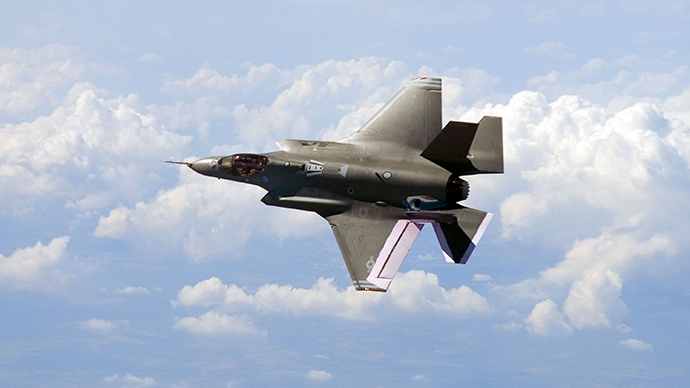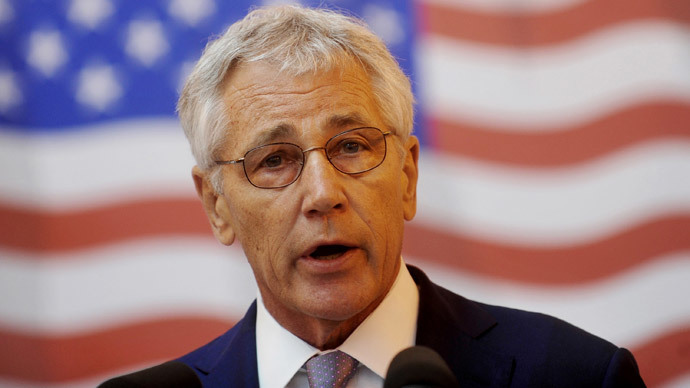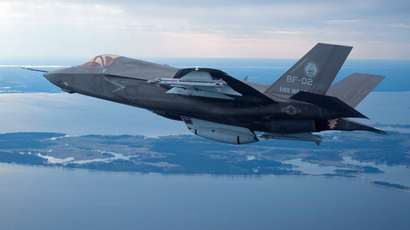Grounded future: Pentagon still bets on plagued F-35s

Notwithstanding the ongoing and costly setbacks occurring as recently as earlier this month, United States Secretary of Defense Chuck Hagel stood by the Pentagon’s F-35 fighter jet program this week during a visit Thursday with pilots.
Hagel, a Vietnam War vet appointed by US Pres. Barack Obama last year to head the Department of Defense, lauded the $400 billion program at Eglin Air Force Base in Florida on Thursday during a pep talk to pilots no sooner than two weeks after the Pentagon grounded its entire fleet of F-35s due to an engine fire. Days later, the jet’s UK debut was cancelled on account of that setback, which today continues to keep the US fleet out of the sky.
Despite the engine fire — only one of the latest in a long series of setbacks suffered by the costly stealth jet program — Sec. Hagel hailed the planes during Thursday’s appearance.
“Issues” aside, Hagel said, the F-35 still represents "the future for our fighter aircraft.”
“I know that there are issues,” Hagel said. “I don’t know of a platform that we’ve ever had, that we’ve ever designed, that we’ve ever tried and then put into service, that didn’t go through issues,” the secretary continued, later adding that he nevertheless has “strong, strong confidence” in those running the program, according to the Omaha World Herald.
As those issues linger on, however, the immediate future of the F-35 program remains uncertain. The Pentagon announced on July 3 that the DOD’s entire arsenal of F-35s would be grounded after an engine fire erupted unexpectedly onboard an aircraft. The jet was supposed to make its UK debut this Monday at the Royal International Air Tattoo show, but that appearance was cancelled on account of the grounding.
"If the F-35 doesn't make it to the show it's quite embarrassing. It will jeopardize the timing of export orders," Richard Aboulafia, an analyst with Teal Group, told the BBC ahead of the last-minute decision to keep the jet from appearing.

Stateside, however, lawmakers largely shrugged off the setback, which is only the latest in a years-long trend of mishaps.
“I just want to keep it going,” Sen. James Inhofe
(R-Okla.), the ranking member of the Senate Armed Services
Committee, told The Hill this week. “It’s too modern to
fail. If we’re going to maintain superiority over other
countries, we have to have that, we can’t do without it.”
“When you develop a new system like this you’re going to have
hiccups,” opined Sen. Bill Nelson (D-Florida). Those
hiccups, Sen. Jack Reed (D-Rhode Island) added, “are not
unusual in a very sophisticated development program like
this.”
Others, like Sen. John McCain (R-Arizona), are questioning the F-35s more than ever, though.
“In some ways it’s too big to fail, but it’s a debacle. We’ve
been fighting this battle of cost overruns and glitches for a
number of years,” McCain reportedly told journalists this
week. “It’s classic example of the
military-industrial-congressional complex.”
Indeed, it’s been an uphill battle for the Pentagon with respect
to putting the final touches on the F-35. The latest grounding of
the fleet marked the eighth time the DOD has been driven to make such a
decision, with the next most recent occurrence happening only
last month when an engine oil leak forced the military to inspect
104 of its jets.
In March, the US Government Accountability Office determined that persistent software problems could delay the program for an additional year, and questioned whether the US could still afford the 2,457 planes that are slated for purchase. They could cost $400 billion – a 68 percent increase over original projections in 2001 – and keeping the program on schedule for 2037 could cost $12.6 billion per year.
In the meantime, Hagel told pilots this week that the fleet will remain on the ground until all its kinks are ironed out.
"Safety is the first priority, and we're not going to ask anyone to risk their lives on any platform, for any reason,” he said.














